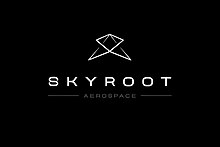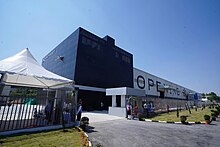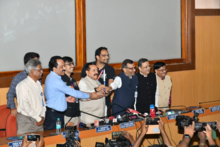Skyroot Aerospace
 | |
 Skyroot Headquarters in Hyderabad, India | |
| Company type | Private |
|---|---|
| Industry | Aerospace |
| Founded | 12 June 2018 |
| Founder |
|
| Headquarters | Hyderabad, Telangana , India |
Key people | Pawan Kumar Chandana (Co-founder, CEO & CTO) Naga Bharath Daka (COO) |
| Products | |
| Services | Launch vehicles |
| Revenue | |
| Members |
|
| Website | skyroot |
Skyroot Aerospace Private Limited is an Indian private aerospace manufacturer and commercial launch service provider headquartered in Hyderabad, Telangana.[2][3] The company was founded by former engineers and scientists from ISRO. It aims to develop and launch its own series of small-lift launch vehicles especially crafted for the small satellite market.
Started in a small setup in Kondapur in 2018 with a team of 10, Skyroot is on a mission to open space for all, by pushing the boundaries of today's technology. Incubated in T-Hub[4] and supported by T-Works,[5] Skyroot Aerospace is India's first rocket launching private company.[6]
History
[edit]

Skyroot Aerospace was formed in July 2018 by former ISRO scientists Pawan Kumar Chandana, Naga Bharath Daka through the support of Vasudevan Gnanagandhi as well as a small group of entrepreneurs including CureFit founders Mukesh Bansal and Ankit Nagor.[8] Skyroot has initially raised US$4.3 million, including from space and defence contractor Solar Industries.[9] The company has been developing its first launch vehicle, the 'Vikram 1', which is on track for its initial launch around the end of 2022.[10][11]
On 6 October 2020, the National Startup Awards 2020 were declared by the Union minister of commerce and industry Piyush Goyal, where Skyroot Aerospace emerged as the winner. The National Startup Awards are given in recognition of startups across several categories that offer novel solutions for complex problems in the country, and creating businesses that are scalable and sustainable.[12]
On 20 November 2020, Skyroot Aerospace entered into a memorandum of understanding with Dhruva Space, an Indian private satellite manufacturer.[13]
On 2 February 2021, ISRO and Skyroot Aerospace signed a non-disclosure agreement (NDA). The NDA will allow Skyroot Aerospace to access the facilities and technical expertise in ISRO centers to develop their launch vehicles.[14]
On 8 February 2021, Skyroot Aerospace announced that they partnered with Bellatrix Aerospace to use the Orbital Transfer Vehicle of Bellatrix Aerospace with their Vikram series of Launch Vehicles.[15]
In March 2021, Skyroot Aerospace team won the Aegis Graham Bell Award for Jury choice award under innovation category for the year 2020.[16]
On 20 May 2021, Skyroot Aerospace had raised $11 million in Series A funding round led by promoters of renewable energy firm Greenko Group (Anil Chalamalasetty and Mahesh Kolli), with participation of investors including Solar Industries and former WhatsApp Chief Business Office (CBO) Neeraj Arora, Mukesh Bansal founder of Myntra & Curefit, Worldquant Ventures, Graph Ventures, Sutton Capital, Vedanshu Investments and few other angels. Skyroot Aerospace will be deploying these funds to grow its team and complete the full development and testing of all subsystems of 'Vikram 1' launch vehicle.
Skyroot has already started bookings for launches starting end 2022 and are actively engaging global customers[17]
The Department of Space has signed an agreement with Skyroot Aerospace for providing it access to ISRO's facilities and expertise towards testing of sub-systems and systems of launch vehicles. Skyroot Aerospace has, therefore, become the first Indian startup to formally enter into an agreement with ISRO for using its assets since the announcement of the new policy decision of the Government of India in May 2020, when finance minister opened up the space sector and ISRO's facilities for private players. Finally on 11 September 2021, ISRO's scientific secretary and chairman of interim IN-SPACe (Indian National Space Promotion and Authorisation Centre) committee R Umamaheswaran, who represented Department of Space, Skyroot Aerospace CEO Pawan Kumar Chandana and COO Naga Bharath Daka signed this framework MoU.[18]
On 22 September 2021, the list of "The 2021 LinkedIn Top Startups" was revealed with 25 young, emerging companies where India wants to work. Skyroot Aerospace was ranked 7th on this LinkedIn's 2021 Top Startups List in India.[19]
On 27 January 2022, Skyroot Aerospace raised of $4.5 million in a bridge round to Series B funding led by Google's founding board member Ram Shriram's Sherpalo Ventures. The bridge round also witnessed participation by Wami Capital, existing investors – former WhatsApp chief business officer Neeraj Arora and ex-Google executive Amit Singhal. Skyroot plans to use the fund to build the infrastructure required to launch space vehicles. This round aids Skyroot to build critical infrastructure early on and helps accelerate towards their launch of 'Vikram 1' in 2022. This fresh investment round brought up the total capital raised by the startup to around $17 million, which was the largest raised by an Indian space start-up as of January 2022.[20]
New Logo  |
Old Logo  |
|---|
On 10 May 2022, Skyroot Aerospace announced their new identity reflecting their ambition to reach the stars with a goal of ‘Opening Space for all’. Their logo subtly crystallizes the acronym 'SR' of SKYROOT into a rocket-plane, while the sharp edges represent their "cutting-edge tech."[21]
On the 11th May 2022, Skyroot Aerospace was recognized with a National Award at the National Technology Day 2022. The Technology Startup Award was won by Skyroot Aerospace for Cryogenic, Liquid and Solid Propulsion Technologies catering to the needs of small satellite launch vehicle market. Jitendra Singh, Union Minister of State, Science and Technology Minister, has given this award.[22]
On 18 November 2022 Skyroot Aerospace performed the maiden launch of its 'Vikram S' suborbital rocket, becoming the first Indian private company to reach outer space (apogee was 89.5 km).[23][24]
In October 2023, the company announced it had raised $27.5 million in a pre-Series C funding round led by Temasek Holdings, bringing the total amount raised since its inception to about $95 million. According to the company, the funding is intended to accelerate launches planned for the next two years.[25][26]
Earth-storable rocket engine
[edit]Raman-1
[edit]In August 2020, Skyroot first came into the limelight when it test-fired the Raman-I (named after C. V. Raman) hypergolic-fuel upper stage engine. This liquid-fuel upper stage is a component of Vikram-I and Skyroot was the first Indian private entity to test such an engine.[27][28][29][30]
Solid rocket motor
[edit]Kalam-5
[edit]On 22 December 2020, Skyroot tested the solid-fuel rocket engine Kalam-5 (named after A. P. J. Abdul Kalam), the first of five planned carbon-composite Kalam rocket motors which are expected to power its launch vehicles.[31][32][33] The test happened in Nagpur at a private test facility owned by Solar Industries, which is also an investor in Skyroot. In the name "Kalam-5", the 5 refers to the peak sea level thrust of 5.3 kN.[34] The final engine in the series will be four times the size of Kalam-5.
Kalam-100
[edit]On 19 May 2022, Skyroot announced the successful completion of a full duration test-firing of its ‘Vikram-1’ rocket stage, representing a major milestone for the company. Named ‘Kalam-100’ after former president and the renowned Indian rocket scientist A.P.J. Abdul Kalam, the third stage of ‘Vikram-1’ produces a peak vacuum thrust of 100 kN (or ~10 Tons) and has a burn time of 108 sec. The rocket stage has been built with high-strength carbon fiber structure, solid fuel, novel thermal protection system, and carbon ablative nozzle. This testing will help Skyroot in development of orbital vehicle Vikram-1 and gives great confidence for the other rocket stages planned to be tested soon. This is largest rocket stage ever designed, manufactured, and tested completely in the private sector. There was a good match of test results with the design predictions in the very first attempt, which is a testimony to the team's capabilities. The state-of-the-art technology like carbon composite case, high propellant volumetric loading up to 94%, lighter EPDM based thermal protection system, and submerged nozzle have been validated through the successful static test.[35][36] The video of the firing[37]
Cryogenic rocket engine
[edit]Dhawan-1
[edit]On 25 September 2020, Skyroot Aerospace unveiled the Dhawan-1 (named after Satish Dhawan) upper stage cryogenic engine that will power heavier-lift systems such as Vikram-II.[38][39] This is the first cryogenic engine in India that will use liquefied natural gas (LNG) as fuel; this fuel has the advantages of being clean, renewable and suited for long duration space missions. Dhawan-1 is 3D printed and designed with a regenerative cooling configuration.[40]
Skyroot successfully test fired India's first privately developed small cryogenic engine called Dhawan-1 running on liquefied natural gas (LNG) and liquid oxygen (LOX) with pressure-fed engine cycle on 25 November 2021. It was a technology demonstration experiment for the upper stage of Vikram-2 rocket that is under active development. Solar Industries provided the test site. The engine made by 3D printing process and using super alloys.[41]
Launch vehicles
[edit]

Skyroot Aerospace has been working on its Vikram series of expendable small-lift launchers. Rockets are designed for very quick assemblies.[42] They also have plans to develop a fully reusable vehicle.
On November 18, Skyroot Aerospace successfully completed the first launch of a private developed rocket from Indian soil.[43]
| Launch Vehicle | Payload capacity | First flight | Total launches | |
|---|---|---|---|---|
| SSPO (500 km) |
Low Earth orbit (500 km; 45°) | |||
| Vikram S (Suborbital) | - | - | 18 November 2022 | 1 |
| Vikram 1 | 290 kg (640 lb) | 480 kg (1,060 lb) | Q3 2023 (planned) | 0 |
| Vikram II | 400 kg (880 lb) | 595 kg (1,312 lb) | TBD | 0 |
| Vikram III | 560 kg (1,230 lb) | 815 kg (1,797 lb) | TBD | 0 |
Launch history
[edit]| S.No | Date / time (UTC) | Rocket, Configuration |
Launch site | Payload | Orbit | Customer | Status | Note |
|---|---|---|---|---|---|---|---|---|
| 1. | 18 November 2022 | Vikram-S | Satish Dhawan | Suborbital | — | Success | ||
| 2. | Q1 2024 | Vikram-1 | Satish Dhawan FLP | Low Earth | TBA | Planned | Maiden flight of Vikram 1 rocket. | |
| 3. | Q2 2024 | Vikram 1 | Satish Dhawan | Low Earth | TBA | Planned | ||
| 4. | Q3 2024 | Vikram 1 | Satish Dhawan | Low Earth | TBA | Planned | ||
| 5. | Q4 2024 | Vikram 1 | Satish Dhawan | Low Earth | TBA | Planned |
Industry Collaboration
[edit]An agreement has been signed by Nibe Space, a division of Nibe Defence and Aerospace on 9 September 2024, with Skyroot Aerospace, Centum Electronics, AgniKul Cosmos, SpaceFields, Sisir Radar, CYRAN AI Solutions, and Larsen & Toubro for the launch of India's first constellation of multi-sensor, all-weather, high-revisit Earth observation satellites.[44]
Gallery
[edit]-
Vikram-S rocket. The first ever privately launched rocket of India.
See also
[edit]- Space industry of India
- Indian Space Research Organisation
- New Space India Limited
- IN–SPACe
- Indian Space Association
- AgniKul Cosmos
- Bellatrix Aerospace
- Pixxel
- Satellize
- List of private spaceflight companies
- Vikram 1
- Agnibaan
- Kalam-series engines
References
[edit]- ^ "Skyroot Aerospace posts Rs 55 Cr loss in FY23". Entrackr.
- ^ Sukumar, C. R. "Skyroot India's first private company to test upper-stage rocket engine". The Economic Times. Retrieved 12 August 2020.
- ^ Narasimhan, T. E. (12 August 2020). "Skyroot Aerospace first private company to test upper stage rocket engine". Business Standard India. Retrieved 12 August 2020.
- ^ "Skyroot's space success story began in Hyderabad's T-Hub". The New Indian Express. 16 December 2022. Retrieved 13 June 2023.
- ^ "TS to host Skyroot facility to design, make, test rockets". The Hindu. 25 November 2022. Retrieved 13 June 2023.
- ^ "India's first private player to successfully test a homegrown rocket engine is on track for its first full rocket launch by 2021". Business Insider. Retrieved 12 August 2020.
- ^ "Skyroot | Opening Space For All". skyroot.in. Retrieved 19 November 2022.
- ^ Kumar, CR; Krishnan, Raghu (17 April 2019). "With a simpler rocket, Skyroot is eyeing the space". The Economic Times. Retrieved 21 August 2020.
- ^ Chowdhury, Shubhangi (11 September 2021). "Skyroot Aerospace becomes first private company to formally enter into an agreement with ISRO". IndianStartupNews. Archived from the original on 11 September 2021. Retrieved 18 April 2022.
- ^ Etherington, Darrell (12 August 2020). "India's first private space launch startup Skyroot succeeds with upper-stage engine fire test". Tech Crunch. Retrieved 21 August 2020.
- ^ "India's first private player to successfully test a homegrown rocket engine is on track for its first full rocket launch by 2021". Business Insider. Retrieved 12 August 2020.
- ^ "3 Hyderabad firms bag top startup awards | Hyderabad News - Times of India". The Times of India. 7 October 2020.
- ^ Dhruva Space [@DhruvaSpace] (20 November 2020). "Broadening the value of our Space and Launch Services we entered into an MoU with @SkyrootA today, India's very own Private Launch Provider. #NewSpace #Satellite #Launch #NewSpaceIndia #skyroot #DhruvaSpace https://t.co/cT0aWdX25h" (Tweet). Retrieved 11 January 2021 – via Twitter.
- ^ "Non-Disclosure Agreement signed with M/S Skyroot - ISRO". Archived from the original on 14 February 2021. Retrieved 18 February 2021.
- ^ @SkyrootA (8 February 2021). "We are delighted to announce our..." (Tweet) – via Twitter.
- ^ @AegisGrahamBell (1 March 2021). "Congratulations Pawan K Chandana and Skyroot team for winning the Aegis Graham Bell Jury's Choice Award" (Tweet). Archived from the original on 1 March 2021 – via Twitter.
- ^ "Skyroot Aerospace raises $11 million in Series-A round led by Greenko founders - Times of India". The Times of India. 21 May 2021.
- ^ "In a first, space dept signs pact with Hyderabad startup to provide access to Isro facilities | Hyderabad News - Times of India". The Times of India. 13 September 2021.
- ^ "LinkedIn Top Startups 2021: The 25 Indian companies on the rise".
- ^ "Skyroot raises funding led by Google's Ram Shriram". 27 January 2022.
- ^ "Rebranding". Twitter. 10 May 2022. Retrieved 10 May 2022.
- ^ "National Award for Technology Startups". Twitter. 11 May 2022. Retrieved 11 May 2022.
- ^ Bhattacharjee, Nivedita (18 November 2022). "India successfully launches first privately made rocket". Reuters. Retrieved 28 August 2023.
- ^ Skyroot Aerospace [@SkyrootA] (18 November 2022). "89.5 Kms peak altitude achieved. Vikram-S rocket meets all flight parameters. It's history in the making for India" (Tweet) – via Twitter.
- ^ "India's Skyroot Raises $27.5 Million In Fresh Funding Round | Aviation Week Network". aviationweek.com. Retrieved 2 November 2023.
- ^ Sadam, Rishika (30 October 2023). "Skyroot raises $27.5 mln, heating up India's private sector space race". Reuters. Retrieved 2 November 2023.
- ^ PTI (13 August 2020). "Hyderabad startup Skyroot Aerospace test-fires upper stage rocket engine 'Raman'". The Times of India. Archived from the original on 9 January 2022. Retrieved 16 August 2020.
- ^ Pandey, Ashish (14 August 2020). "Hyderabad-based startup Skyroot Aerospace's Raman: India's first homegrown rocket engine". India Today. Retrieved 16 August 2020.
- ^ Goyal, Shikha (17 August 2020). "First Indian start-up firm Skyroot Aerospace to test fire rocket engine 'Raman': All you need to know". Jagran Josh. Retrieved 21 August 2020.
- ^ "Skyroot Aerospace becomes first Indian startup to test upper-stage rocket engine". The Asian Age. 13 August 2020. Retrieved 14 December 2020.
- ^ "Skyroot tests solid propulsion rocket engine, aims at a rocket by 2021 end". The Economic Times. 28 December 2020. Retrieved 31 December 2020.
- ^ Etherington, Darrell (29 December 2020). "Skyroot successfully test fires India's first privately-made solid rocket stage". TechCrunch. Archived from the original on 10 November 2021.
- ^ Skyroot Aerospace: Kalam-5 Solid Rocket Motor Test Fire, 27 December 2020, retrieved 25 November 2021
- ^ "Skyroot Aerospace becomes first Indian company to test-fire solid-fueled rocket engine". 28 December 2020.
- ^ "Skyroot successfully test fires space launch vehicle 'Vikram-1' rocket stage", The Hindu, 19 May 2022, retrieved 19 May 2022
- ^ Indian launch startup Skyroot successfully completes full-duration stage test, retrieved 19 May 2022
- ^ Static Fire Test, Vikram-1 Stage 3, Kalam-100, 18 May 2022, retrieved 19 May 2022
- ^ Burgess2020-09-25T09:58:00+01:00, Molly (25 September 2020). "Skyroot Aerospace unveils cryogenic rocket engine". gasworld. Retrieved 26 September 2020.
{{cite web}}: CS1 maint: numeric names: authors list (link) - ^ Siddarth MP (25 September 2020). "Startup Skyroot Aerospace unveils India's first privately developed Cryogenic Rocket engine". Zee News. Archived from the original on 25 September 2020. Retrieved 25 September 2020.
- ^ "Space startup unveils India's first privately developed Cryogenic Rocket engine". WION. 25 September 2020. Retrieved 25 September 2020.
- ^ Kumar, Chethan (25 November 2021). "Cryogenic: India's first private cryogenic engine test fired by Skyroot". The Times of India. Archived from the original on 27 November 2021. Retrieved 25 November 2021.
- ^ "Launch Vehicle". Skyroot Aerospace. 10 January 2019. Archived from the original on 15 December 2020. Retrieved 21 August 2020.
- ^ Madhok, Swati Gupta, Diksha (18 November 2022). "India's first private rocket Vikram-S is launched into space | CNN Business". CNN. Retrieved 20 November 2022.
{{cite web}}: CS1 maint: multiple names: authors list (link) - ^ Shukla, Ajai (11 September 2024). "Nibe shoots for stars with Earth observation satellite constellation". Business Standard. Retrieved 18 September 2024.
External links
[edit]- Aerospace companies
- Rockets and missiles
- Indian private spaceflight companies
- Private spaceflight companies
- Rocket engine manufacturers of India
- Commercial launch service providers
- Spacecraft manufacturers
- Indian companies established in 2018
- Manufacturing companies based in Hyderabad, India
- Indian brands
- Space programme of India
- 2018 establishments in Telangana


